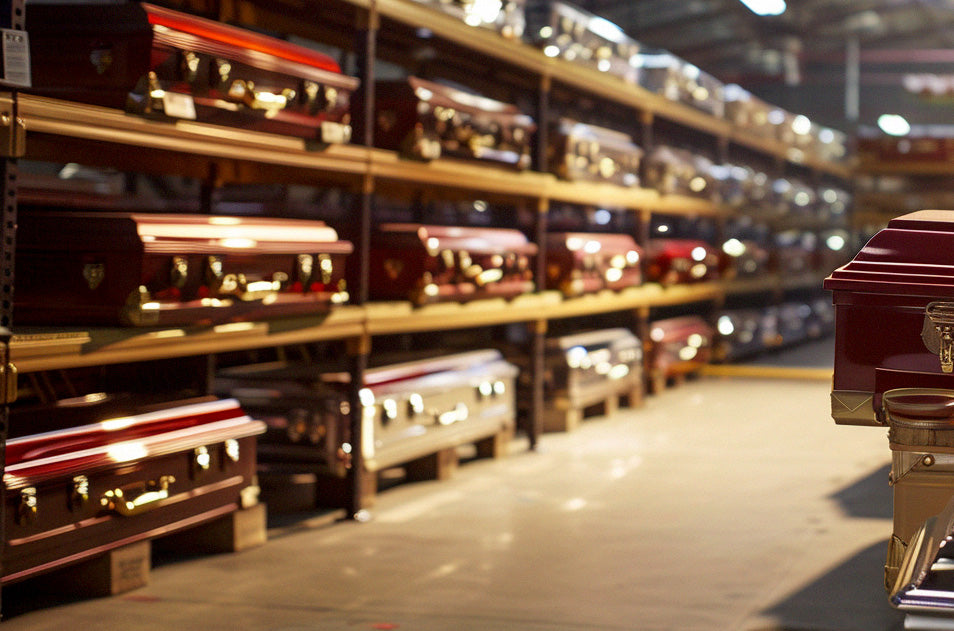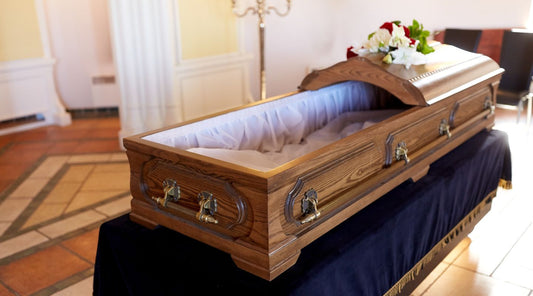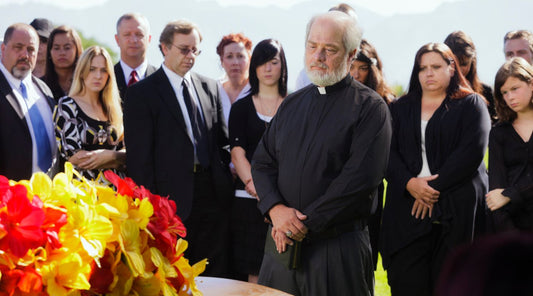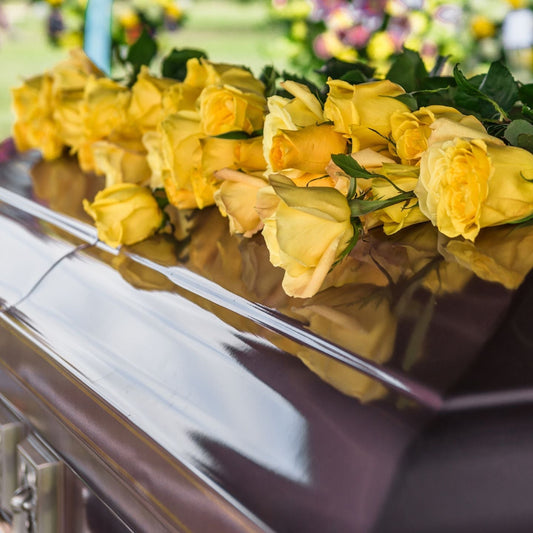
How Long Do Funeral Caskets Last?
The closing of a funeral casket and its subsequent burial suggest a certain finality. In reality, burying a casket begins a journey that may or may not include uninterrupted eternal rest. Take Abraham Lincoln, for instance.

In 1876, a gang of Chicago counterfeiters attempted to steal President Abraham Lincoln's body from his tomb in Oak Ridge Cemetery, Illinois, to hold it for ransom. They were stopped, but fearing a copycat attack, Lincoln’s friends relocated his coffin to a hiding place between the walls of his tomb. This worked for a while, but Abe was exhumed again in 1901 and placed in an unmarked grave while construction got underway for a permanent resting place in Springfield, Illinois. In this new memorial tomb, Lincoln's body was placed in a steel cage encased in concrete to prevent any future theft attempts.
There is little information on the condition of Lincoln’s corpse after each exhumation, but this does beg the question, “How long do funeral caskets last?”
Caskets made from materials such as steel, wood, and biodegradable substances offer varying degrees of durability. Metal caskets, particularly those made from 18-gauge steel or more robust metals like stainless steel, bronze, and copper, are noted for their corrosion resistance and can last up to 100 years under optimal conditions. Conversely, while aesthetically pleasing and traditional, wooden caskets decompose more rapidly due to their organic nature, especially in humid environments. Biodegradable caskets, designed for eco-friendly burials, decompose within a few years, aligning with sustainable practices.
Environmental factors, including soil moisture, temperature, and microbial activity, significantly influence the rate of casket decomposition. Features such as rubber gaskets and burial vaults are employed to mitigate these effects, providing additional protection against the elements. Historical anecdotes, from preserving ancient Egyptian coffins to modern exhumations, illustrate the diverse approaches and challenges associated with casket longevity. By exploring these elements in detail, this article provides a comprehensive guide to understanding how long caskets last and the factors contributing to their preservation.
Factors Influencing Casket Longevity
A casket's longevity is influenced by various factors, including the materials used, environmental conditions, and the presence of features designed to protect it from external elements.
Materials Used

Metal caskets are known for their durability, particularly those made from 18-gauge steel, stainless steel, bronze, and copper. Steel caskets, especially those with a protective finish, can last between 50 to 100 years under optimal conditions. These caskets are designed to resist corrosion, though they will eventually succumb to rust due to chemical reactions with soil and moisture over time. Stainless steel, bronze, and copper caskets offer even greater durability, often outlasting standard steel caskets due to their resistance to corrosion.

Wooden caskets, while aesthetically pleasing and often preferred for their natural look, do not last as long as metal caskets. Hardwood caskets made from mahogany, walnut, and oak are more durable compared to softwoods like pine. However, all wooden caskets are susceptible to decay due to the natural biological processes facilitated by microorganisms in the soil. In optimal conditions, a well-constructed hardwood casket can last several decades, but in damp environments, they may decompose in less than 10 years.
Biodegradable caskets, made from materials like cloth, cardboard, and wicker, are designed for quick decomposition and are often chosen for their minimal environmental impact. Once buried, they are expected to last 3-5 years.
Environmental Factors
The surrounding environment significantly affects the rate of casket decomposition. Soil conditions such as moisture levels, temperature, and the presence of microorganisms can accelerate the breakdown process. Caskets in humid and hot environments, particularly those made from wood, decompose faster due to increased microbial activity. Additionally, soils with high acidity can corrode metal caskets more quickly, reducing their lifespan even if they are made from durable materials.
Climate also plays a critical role. Caskets buried in dry, cool climates tend to last longer than those in wet, warm climates. This is because the reduced moisture and lower temperatures slow down the chemical reactions and microbial activity that lead to decomposition.
Features Enhancing Casket Longevity
Various features can significantly enhance a casket's longevity, ensuring that it remains intact and protected against environmental factors. These features include sealing mechanisms, the use of burial vaults, and specific design elements that contribute to the casket's durability.
Sealer Caskets
One of the most critical features affecting casket longevity is the presence of a sealing mechanism. Sealer caskets have rubber gaskets that create an airtight seal when the lid is closed. This feature helps prevent water, dirt, and other environmental elements from entering the casket, thereby slowing down the decomposition process of the casket and its contents. The airtight seal provided by these gaskets can significantly extend the life of a metal casket by preventing moisture-induced corrosion.
Burial Vaults
The use of burial vaults is another essential factor that enhances casket longevity. Burial vaults are protective outer containers that encase the casket, shielding it from soil pressure, groundwater, and other environmental factors that can accelerate decomposition. Typically made from reinforced concrete, plastic, or metal, these vaults provide a stable and dry environment for the casket, significantly extending its lifespan. By preventing direct contact with the surrounding soil, burial vaults help maintain the casket's structural integrity over a much longer period.
Design Elements
Certain design elements also play a role in prolonging casket durability. Features such as reinforced corners, thicker materials, and high-quality finishes can enhance the casket's resistance to environmental stresses. For instance, metal caskets often have a protective coating that prevents rust and corrosion, while wooden caskets might be constructed with thicker planks and treated with preservatives to resist decay. Additionally, caskets designed with adjustable beds and internal supports can help maintain their shape and prevent collapse over time.
By incorporating these features, caskets can better withstand the challenges posed by burial environments, ensuring a longer-lasting resting place for the deceased.

Environmental and Practical Considerations
When selecting a casket, environmental and practical considerations play crucial roles. These factors influence not only the casket's longevity but also its environmental impact and the overall burial process.
Sustainability
Individuals increasingly opt for eco-friendly caskets made from biodegradable materials such as cloth, cardboard, and wicker. These materials decompose rapidly, typically within 3-5 years, minimizing environmental impact and aligning with green burial practices. Biodegradable caskets support the natural process of decomposition, allowing the body to return to the earth more swiftly and reducing the ecological footprint of traditional burial methods.
Environmental Conditions
The conditions of the burial site are a significant factor in determining casket longevity. Soil moisture levels, temperature, and the presence of microorganisms can all accelerate the decomposition process. For instance, caskets buried in humid and hot environments decompose faster due to heightened microbial activity and moisture levels. Conversely, dry and cool climates can prolong the lifespan of caskets by slowing down the biological and chemical processes that lead to decomposition. It’s essential to consider the local climate and soil conditions when choosing a casket material and design.
Practical Tips for Selection
Choosing the right casket involves balancing durability, aesthetic preferences, and environmental considerations. Metal caskets provide long-term preservation but can be more expensive and environmentally taxing due to their production and slower decomposition rates. Wooden caskets, while offering a natural and traditional appearance, decompose faster, making them suitable for those preferring a quicker return to the earth. Biodegradable options are ideal for eco-conscious individuals, though they may lack the durability of metal or hardwood caskets.
Practical considerations also include the cost of the casket and associated burial accessories. Metal and hardwood caskets are more expensive, reflecting their durability and craftsmanship. Biodegradable caskets are generally more affordable and support sustainable practices. Additionally, features like burial vaults can add to the overall cost but significantly enhance the longevity of the casket.


